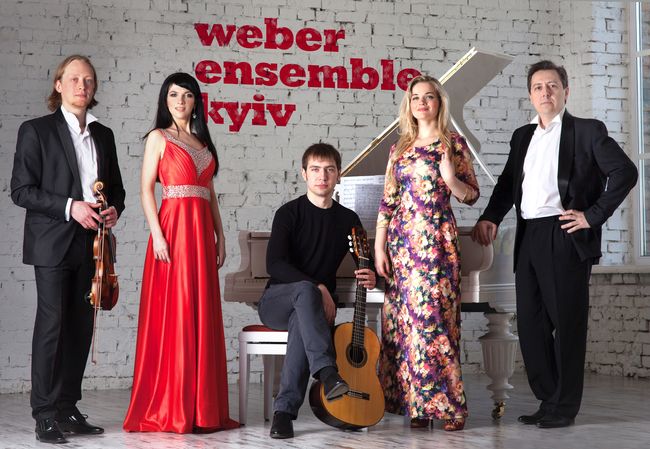Lyre and Sword
The Ukrainian premiere of Carl Maria von Weber’s war song cycle was held in Kyiv
The concert’s venue was the Master Class cultural and educational center. The Lyre and Sword cycle was performed by members of the recently-formed band Weber Ensemble Kyiv, demonstrating high relevance of the 200-year-old German work in contemporary Ukraine.
Disproving the thesis that the muses sleep amid roaring cannons, German poet Carl Theodor Koerner wrote his best poems during the German Liberation War against Napoleon. He did it right on the battlefield, too! He went to the war voluntarily, leaving all the amenities of his comfortable life and his bride behind, obeying the call of the heart and the manifesto of the Prussian king Friedrich Wilhelm III. The 21-year-old poet wrote his last poem, “Song of the Sword,” a few hours before his heroic death in 1813, and thanks to Weber’s music, it, just as other Koerner’s lines set to music, quickly became so famous that the hero’s contemporaries called Koerner an outstanding poet.
Two centuries later, Weber’s cycle with Koerner’s lyrics Lyre and Sword is almost entirely forgotten at home (only a few songs remain popular), while we had never heard it at all! The idea to perform this work occurred to the Weber Ensemble Kyiv’s founder pianist Roman Riepka when he was shocked by the German text’s relevance to our present. The “bridges” between the two realities span exactly 200 years. Three parts of the cycle were created in 1814, 1815, and 1816, and the first and second of them resonate with the events that we experienced in 2014 and 2015 at Maidan and in eastern Ukraine, while the third, dedicated to reflections rather than fighting, may become relevant for us in 2016.
The first part’s performers were soprano Solomia Pryimak and pianist Roman Riepka, who should not be called accompanist in this case, for his piano’s party was worthy of an orchestra. The starting song depicted a mighty storm that echoed Franz Schubert’s ballad Forest King (written, incidentally, in 1815), as well as episodes of Richard Wagner’s opera tetralogy The Ring of the Nibelung. Three songs of the first division, extremely masterfully performed by Pryimak, sounded like a tribute to Robert Schumann’s song cycles and the musical language of the late 19th and early 20th centuries. The singer featured a polished German pronunciation and vocal intonation, with her timbre staying the same across the range, and lingered on high notes with the skill of an Olympic-level athlete. Delicate courage, resilience of pure and faithful heart are not only qualities that Pryimak put in every sound, but also features of our women fighting on the frontlines. Of course, only men fought in wars in Weber’s time, but the idea to entrust performing of this part of the cycle to a woman was completely justified not only in terms of music, but also as a tribute to Ukrainian realities, because 938 servicewomen have been deployed to the anti-terrorist operation area.
The second part reflected very different emotions, featuring music appeals and music posters. Performance by baritone Pavlo Hryshchenko was colorfully patriotic, as he sang clearly and emotionally at once, getting the feel of his part as a poet-in-arms. From purely artistic perspective, this part’s music was of applied nature with its simple texts and chopped rhythms that are well suited for soldiers to sing while marching on.
The third part had even more interesting structure. Unlike the first two, it was completely composed of one, but a very long song, which was made out of pieces of music by Prince Louis Ferdinand. It was indicated on the note sheet by the alternation of two types of material, signified by letters C.M. over Weber’s text and P.L. over episodes borrowed from Prince Louis’s legacy. Meanwhile, the lyrics speak of creative individual’s hesitation as they are no longer rushing at the enemy, but rather reflecting on the price that we pay for wars.
The Weber Ensemble Kyiv band, the very creation of which seemed a utopian dream at first, since composer Weber is very distant from us in place and in time, has been proving with its concerts that it is getting relevant to the present that is the key condition of success. The fact that the works of this composer are completely unknown in this country, except for opera The Freeshooter and Invitation to Dance, which is limited to balls, only sparks even greater interest in the performance. The musicians’ portfolio includes a lot of scores which anticipated the processes that took place later in the music of the 19th and 20th centuries, and, as the latest concert showed, can be extremely relevant and timely in our 21st century as well.
Newspaper output №:
№63, (2015)Section
Culture





